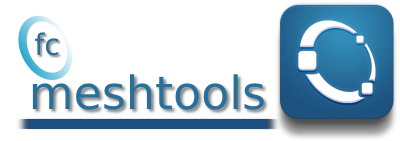


 Octave package contains some simplicial meshes given by their vertices array q and connectivity array
me. Theses meshes can be easily used in other Octave codes for debugging or testing purpose.
Octave package contains some simplicial meshes given by their vertices array q and connectivity array
me. Theses meshes can be easily used in other Octave codes for debugging or testing purpose.
|
| |||||
| Version | date | package | full archives | install | User guide |
| 0.1.4 | December 21, 2022 | ||||
This package was only tested on Ubuntu 22.04.1 with Octave 7.3.0.
For this method, one just have to get/download the install file ![]() ofc_meshtools_install.m Thereafter, one
run it under Octave. This command download, extract and configure the fc-meshtools and the required fc-tools
package in the current directory.
ofc_meshtools_install.m Thereafter, one
run it under Octave. This command download, extract and configure the fc-meshtools and the required fc-tools
package in the current directory.
For example, to install this package in ~/Octave directory, one have to copy the file ofc_meshtools_install.m in
the ~/Octave directory. Then in a Octave terminal run the following commands to install the  package
package
Parts of the <fc-meshtools> Octave package. Copyright (C) 2018-2023 F. Cuvelier <cuvelier@math.univ-paris13.fr> 1- Downloading and extracting the packages 2- Setting the <fc-meshtools> package Write in ~/Octave/fc-meshtools-full/fc_meshtools-0.1.4/configure_loc.m ... 3- Using packages : -> fc-tools : 0.0.35 -> fc-bench : 0.1.3 -> fc-amat : 0.1.3 with fc-meshtools : 0.1.4 *** Using instructions To use the <fc-meshtools> package: addpath(’~/Octave/fc-meshtools-full/fc_meshtools-0.1.4’) fc_meshtools.init() See ~/Octave/ofc_meshtools_set.m
~/Octave/fc-meshtools-full
and, for each Octave session, one have to set the package by:
If it’s the first time the fc_meshtools.init() function is used, then its output is
Try to use default parameters! Use fc_tools.configure to configure. Write in ~/Octave/fc-meshtools-full/fc_tools-0.0.35/configure_loc.m ... Try to use default parameters! Use fc_bench.configure to configure. Write in ~/Octave/fc-meshtools-full/fc_bench-0.1.3/configure_loc.m ... Try to use default parameters! Use fc_amat.configure to configure. Write in ~/Octave/fc-meshtools-full/fc_amat-0.1.3/configure_loc.m ... Using fc_meshtools[0.1.4] with fc_tools[0.0.35], fc_bench[0.1.3], fc_amat[0.1.3].
fc_meshtools.init() function is
For uninstalling, one just have to delete directory
~/Octave/fc-meshtools-full
0.1.4 (December 21, 2022):
0.1.2 (January 3, 2020): change on installation/configuration files and use of the fc-amat package.
0.1.0 (March 22, 2019): first online version.
|
| |||||
| Version | date | package | full archives | install | User guide |
| 0.1.2 | January 3, 2020 | ||||
| 0.1.0 | March 22, 2019 | ||||